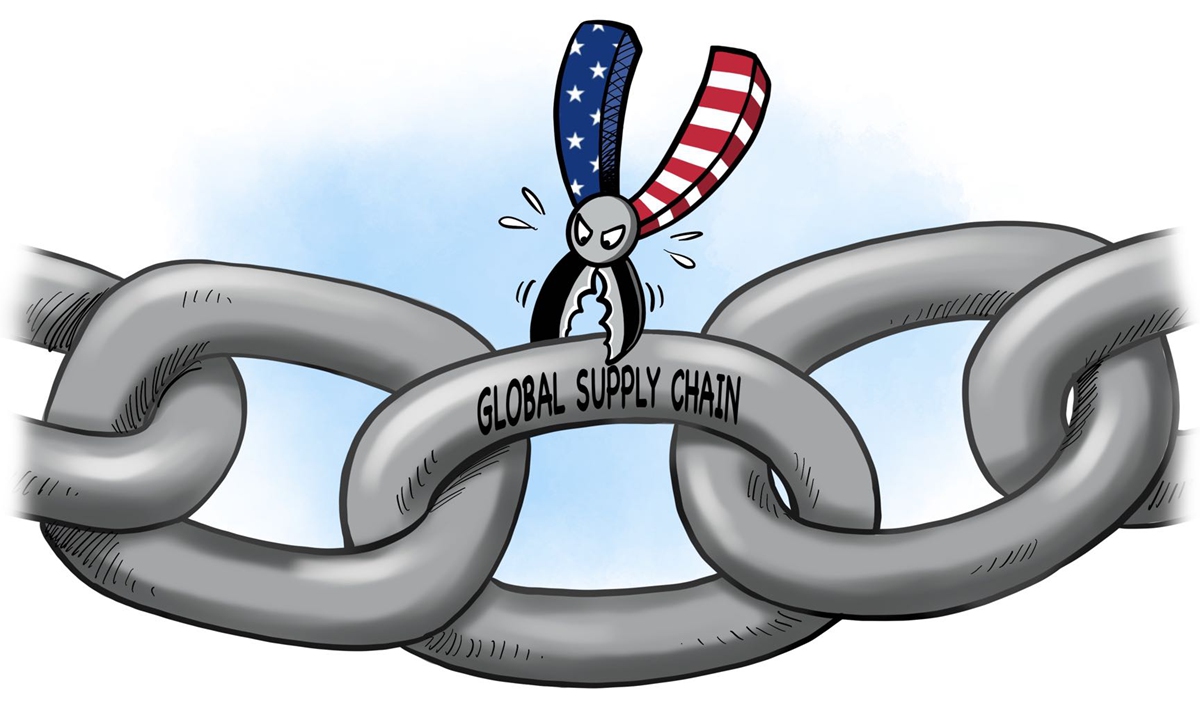LATEST INSIGHTS
Your Present Location: LATEST INSIGHTSDing Gang: US disrupting supply chain shakes up international relations
Source: GT Published: 2022-12-01

When restructuring supply chains becomes a policy priority for the major industrial powers, international relations among them and those formed after the World War II will inevitably begin to reshuffle.
The dramatic changes in China-US relations in recent years started with an adjustment of trade and supply chains.
The process of restructuring the US supply chain through trade wars and chip wars is still in progress, and the China-US relationship, even if it can be eased, will be different from the past.
We often say that the China-US economic and trade relationship is an anchor in the bilateral relationship, but when the weight of this anchor changes, the foundation of the bilateral relationship changes as well.
And It's not just the change of the China-US relationship.
When major South Korean companies start moving to the US market, more profits and earnings will go to the US. The Seoul-Washington relationship thus changes as a consequence.
Then there is Taiwan Semiconductor Manufacturing Company (TSMC), which is following Washington's direction and is about to invest $12 billion in a US plant to produce 5nm chips.
The transatlantic alliance also saw cracks when Germany's BMW and VW decided to invest billions of dollars in the US to produce electric cars and power batteries, respectively.
According to several French media reports, French President Emmanuel Macron recently hosted a dinner at the Elysée Palace, and invited many European entrepreneurs, hoping to convince them not to move their industrial lines to the US and urge them to invest at home. Macron has made this issue one of the main topics of his visit to Washington.
Since the post-WWII period, many emerging economies, represented by China, have pursued globalization and participated in the international division of labor, enhancing their position in the global economic system, as well as strengthening the interdependence of the global economy, forming an important driving force for changes in international relations in the post-WWII period.
However, the "sweep" of the global market by the power of Western capital, which Marx foresaw long ago, has not fundamentally changed.
The reorganization of supply chains implies the reorganization of profits, markets, technologies, and employment, especially the reorganization of a country's domestic and foreign trade and economic structures.
The competition between countries, especially between industrialized countries on global platform, has been increasingly becoming a zero-sum game.
After the launch of the Inflation Reduction Act by Washington, it was widely believed in the European media that this massive subsidy program to protect US manufacturers could be a "fatal blow" to the development of European industries, which are already struggling with high energy prices due to the war between Russian and Ukraine.
The US is the strongest industrial country. The US CHIPS Act, the Biden-Harris Plan to Revitalize American Manufacturing and Secure Critical Supply Chains, and the recent Inflation Reduction Act have created an unprecedentedly strong atmosphere throughout the US to reinvigorate manufacturing. With more foreign and US investment in manufacturing, the original global industrial division of labor will be disrupted, and other countries will have to reconsider their relationship with the United States.
In the past, Washington's cry of "re-industrialization" was supported to some extent by manufacturing and capital forces, but this was more because the labor arbitrage effect of outsourcing by US companies was weakened and the coordination cost of offshore manufacturing was increased. But this time it is different, it's led by the state, by Washington's foreign relations and domestic policies to boot.
Of course, the US cannot single-handedly change the global supply chain, much less be fully self-sufficient. But when it makes this a strategic goal, it will do its best to contain China's development in the global supply chain, make every effort to keep the international supply chain in its own hands, and restructure its relations with its allies accordingly. This is the fundamental reason why the existing global order is being shaken up.























































































 京公网安备 11010802037854号
京公网安备 11010802037854号





